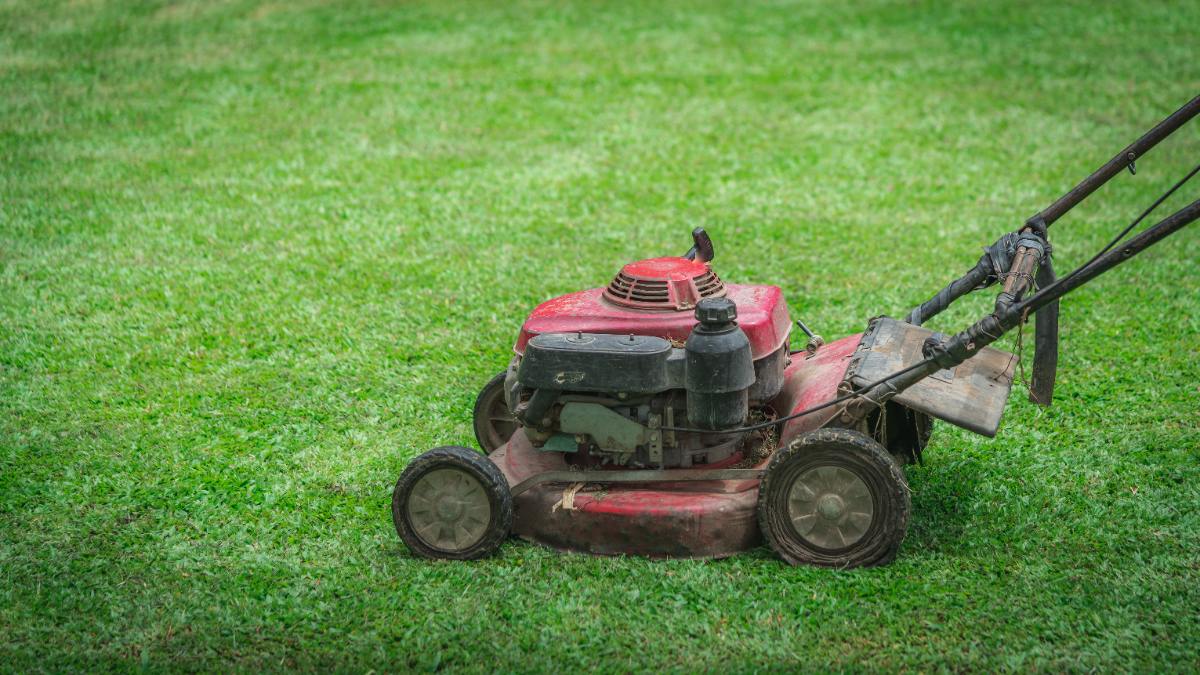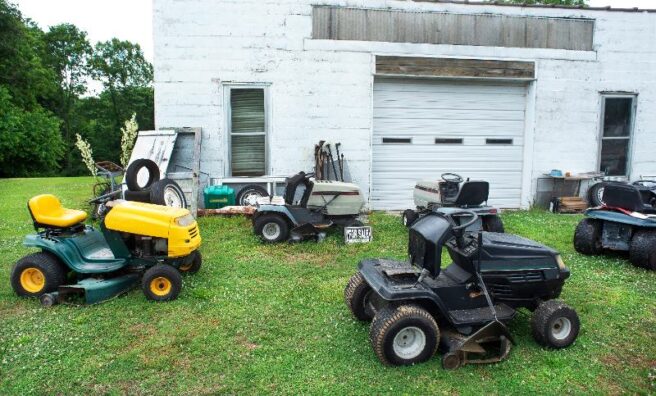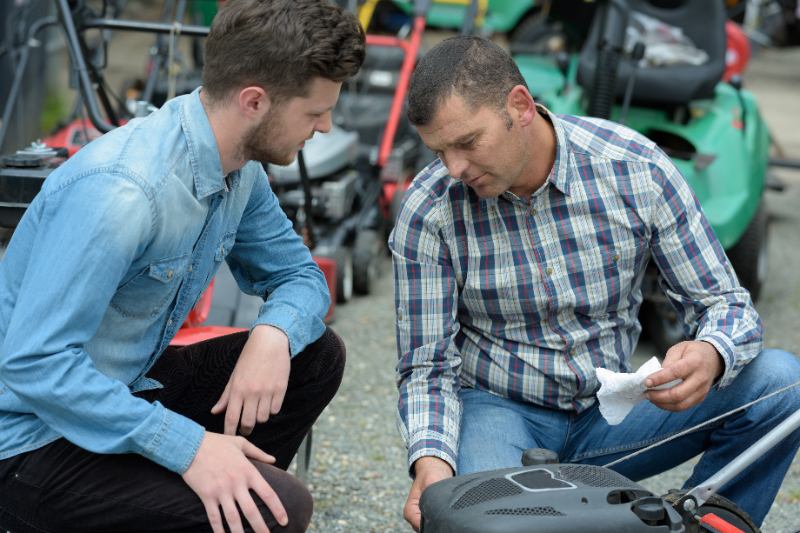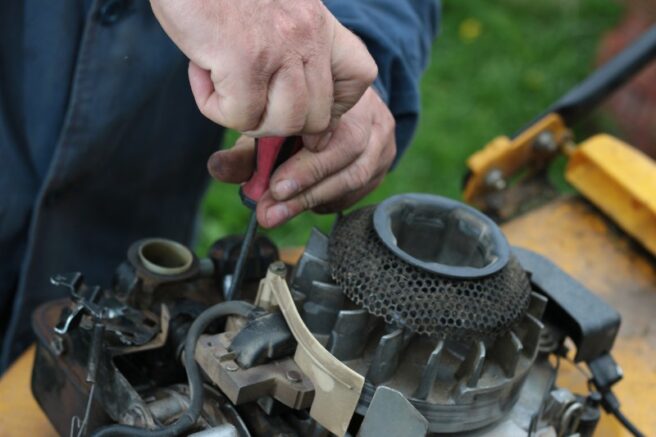
Regular trash won’t accept lawn mowers, so explore disposal options like selling or donating your mower, taking it to the landfill, trading it in, recycling non-working mowers, or selling it for parts.
With tips from an expert, discover the top 8 ways to dispose of a lawn mower without breaking a sweat.
Top Disposal Methods
Getting a new mower can be an exciting time as a homeowner, and people don’t often think about what they’re doing with their old one until they’re standing in the garage looking at two mowers.
There are several ways to get rid of an old mower. You need to consider the type of mower (gas vs. electric), whether it is still running, whether you want to make some money, and what services are available locally.
See Related: When is the Best Time to Buy a Lawn Mower?
Put it Up for Sale

One of the best ways to get rid of a working mower is to sell it. Taking this route will help offset the cost of a new mower, which can be a spendy purchase.
Selling a used mower is relatively easy today thanks to online marketplaces. Selling it online is especially helpful if you can’t transport it — you can specify buyer pick up in your listing.
Here’s how to create a listing on an online platform:
- Take a few pictures of the mower, including underneath the deck and the blades.
- Write up a short listing to create an ad on Facebook Marketplace, NextDoor, OfferUp, UsedMowersOnline, etc. Be specific and honest about the condition.
My Tip: List your mower for sale in the spring or summer, when people are actively doing yard work. Facebook is my go-to platform for selling items, but you may have more options available in your area.
Donate for a Tax Benefit
Sometimes it’s easier to donate a mower to a worthy cause and claim the tax deduction.
To start, you’ll need to find local organizations or charities that accept lawn mowers. A quick online search may turn up some ideas, or you could make a couple of quick phone calls.
Some ideas that come to mind:
- Community gardens
- Habitat for Humanity ReStores
- Animal shelters
- Veteran car donations
- Churches
- Vocational schools (small engine repair programs)
- Community colleges (landscaping or mechanics programs)
Once you find an organization, contact them to arrange a drop-off or pick-up, and get the process rolling.
My Tip: Don’t forget to get a formal receipt if you’d like to claim the tax deduction.
Give to Someone in Need
If you want a feel-good disposal method, think about giving your working mower to someone in need. Reach out to friends and family to see if they know someone who could use it, or look for local “blessings” pages online.
Trade-in Programs

Similar to buying a new car, you may be able to trade in your used mower to reduce the purchase price of a new one. This option is typically not available when purchasing through a local big-box store like Lowe’s or Home Depot, but it may be when dealing with a local lawn equipment dealer.
By trading it in, you’ll receive less money than if you sell it privately; however, the convenience may make up for the difference.
When considering a trade-in, start researching the specific terms of companies or manufacturers that offer trade-in programs. Some places may have specific requirements regarding the age or brand of the mower.
When I reached out to East Idaho Power Equipment, Deagan King, a manager, explained that trading in a mower can be helpful when buying a new one. Instead of spending money on repairs (which could be $500 to $1,000 for a riding or zero-turn mower), save that money, put it toward a new mower, and trade in your old mower for an extra discount.
The money set aside for repairs, the trade-in value, and 0% interest financing options can help lower monthly payments, getting you into a low-cost, high-rewards program.
Then, when it’s time to take your old mower in, get it in the best condition possible: Make sure it’s clean, and tighten any loose parts.
My Tip: If you’re switching from a gas mower to an electric one, check with your local municipality to see if they offer rebate programs for switching to electric lawn equipment.
Municipal Disposal or Collection Programs
In some cases, you can throw your gas-powered lawn mower away. You’ll need to check with your local municipality and see what their guidelines are, and you likely won’t be able to just leave it out by your garbage can.
In many areas, you need to remove the oil and gas, and then you can take it to the landfill or schedule a curbside pickup. Call the local government office or check their website for more information.
My Experience: Here in my town, after I remove the gas and oil from the machine, I can either take it to the transfer station or call the city’s sanitation department and schedule a pickup. There isn’t a fee involved for either disposal method.
Electric mowers need to be taken to a local e-cycling program that recycles electronic components. You can check Earth911 to find one in your area.
Check with Small Engine Repair Shops

Just because your mower doesn’t work, it doesn’t mean you can’t make money off of it. If it’s still in decent condition but has a problem that is too expensive to repair, consider seeing if any local repair shops are interested in buying it.
Sometimes, they’ll buy non-working mowers, fix them, and then sell them. Other times, they may purchase mowers for parts.
Scrap Metal Recycling
A good way to dispose of a non-working gas-powered lawn mower is to disassemble it and recycle the metal parts for scrap. Recycling is an environmentally friendly disposal option, but you’ll need to find a local facility that accepts mowers.
Some places will accept the mower as a whole, while others will require you to disassemble it and bring the separated materials. The scrap yard will weigh the different types of metals and pay based on the weight.
Junk Removal Services
When dealing with a large lawn mower — especially one that doesn’t run — sometimes the easiest option is to call a local junk removal company and arrange for them to get your mower. These services specialize in disposing of appliances and equipment, so they know what to do with your mower when they haul it away.
Keep in mind, these services aren’t free. Most places have a minimum charge for a load, regardless of the size. However, it is a hassle-free option, so the cost may be worthwhile.
My Experience: Last summer, I used a junk removal company to clear out my garage, including an old weed trimmer. They had a $55 minimum charge for anything under one-eighth of a trailer load, which was comparable to other local companies. I paid about $125 for everything, but it saved me at least 4 trips to different places.
Before You Dispose of Your Lawn Mower
Before hauling your mower off to the dump or even a recycling center, you’ll need to get it ready for disposal. The steps are relatively simple, although they differ slightly between gas and electric mowers.
Gas Mower: Since they’re considered hazardous materials, you’ll need to drain the gas and oil out of your mower. Try to do this at least 24 hours before disposing of it.
Electric Mower: Preparing an electric mower for disposal is much easier. Simply remove the battery from the device and take it to a local e-waste recycling facility for proper disposal. The mower can then usually be taken to the landfill.
FAQ About Disposing of a Lawn Mower
If your mower is relatively new, and the mower repair costs are manageable, it’s usually better to fix problems.
However, if your mower is more than 10 years old or the repairs will cost more than 60%-70% of the cost of a new mower, you’re better off buying something new.
According to King, when it comes to repairing versus replacing, “[i]f you end up needing to make large repairs and the cost is high, it is likely best to put that into a new mower that will last longer.”
As for having repairs done, you can opt to DIY, or you can have your mower serviced by a small engine repair shop or local equipment dealer.
See Related: 11 Signs It’s Time to Replace Your Lawn Mower
In most areas, the best way to dispose of gas and oil is to take them to a local household hazardous waste (HHW) facility. Sometimes, auto parts stores will accept used oil, but there may be limitations on the quantity, and they may charge a small fee for the service.
Leave it to the Pros
The next time you’re disposing of an old mower, skip buying a new one and hand your lawn care over to the professionals. LawnStarter can put you in touch with local lawn care gurus who can tackle mowing, fertilizing, and weed control. Plus, when their mower finally quits, you’re not in charge of disposal.
Main Image: Old push mower. Photo Credit: Aris Suwanmalee / Adobe Stock